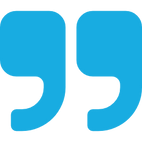



Part 1: Your Professional Self
The first step in changing classroom practice is, in our opinion, viewing ourselves as professionals with highly developed abilities, doing challenging and important work. Teaching is more than a job, it is a profession that requires a set of skills that take many years to master and a lifetime to hone.
Master educators understand that teaching is both an art and a science. It can't be reduced to numbers and data. Or a series of steps and strategies. And it wont' be transformed by simply attending a district workshop. (Full disclosure: we've attended and given them.)
The ISTE Standards outline several roles for educators: Learner, Leader, Citizen, Collaborator, Designer, Facilitator and Analyst. These roles are then divided into two categories. Empowered Professional and Learning Catalyst. The first signals a shift not only in autonomy and self-determination, but of status. The second highlights the power we have to effect change. Both are important but to us the most important word to remember is...
Professional.

Thoughtful curriculum design and implementation are essential for effective teaching and learning, and universal design for learning provides a framework for accomplishing this. However...expertise is not a state of arrival - it's a state of becoming. Educators are learners, too, who reflect on, refine, and improve their practice. All effective teaching is both science and art, requiring practitioners to accept some trial and error and commit to reflection and revision practice as needed.
.png)
Next Steps
The first dip into the pool begins with an exploration of your professional self. You may already complete professional growth plans, participate in collaborative inquiry and drive the majority of your professional learning. This is amazing! It's where we all need to be! The next three chapters will definitely support your leadership activities.
Or, if you are just starting out, only attending PD sessions dictated by your district, or somewhere in between, the following chapters are worth taking the time to explore before jumping into UDL:
-
Chapter 1: Taking Ownership of (Professional) Learning
-
Chapter 2: Professional Development versus Professional Learning
-
Chapter 3: What's Your Zone?


